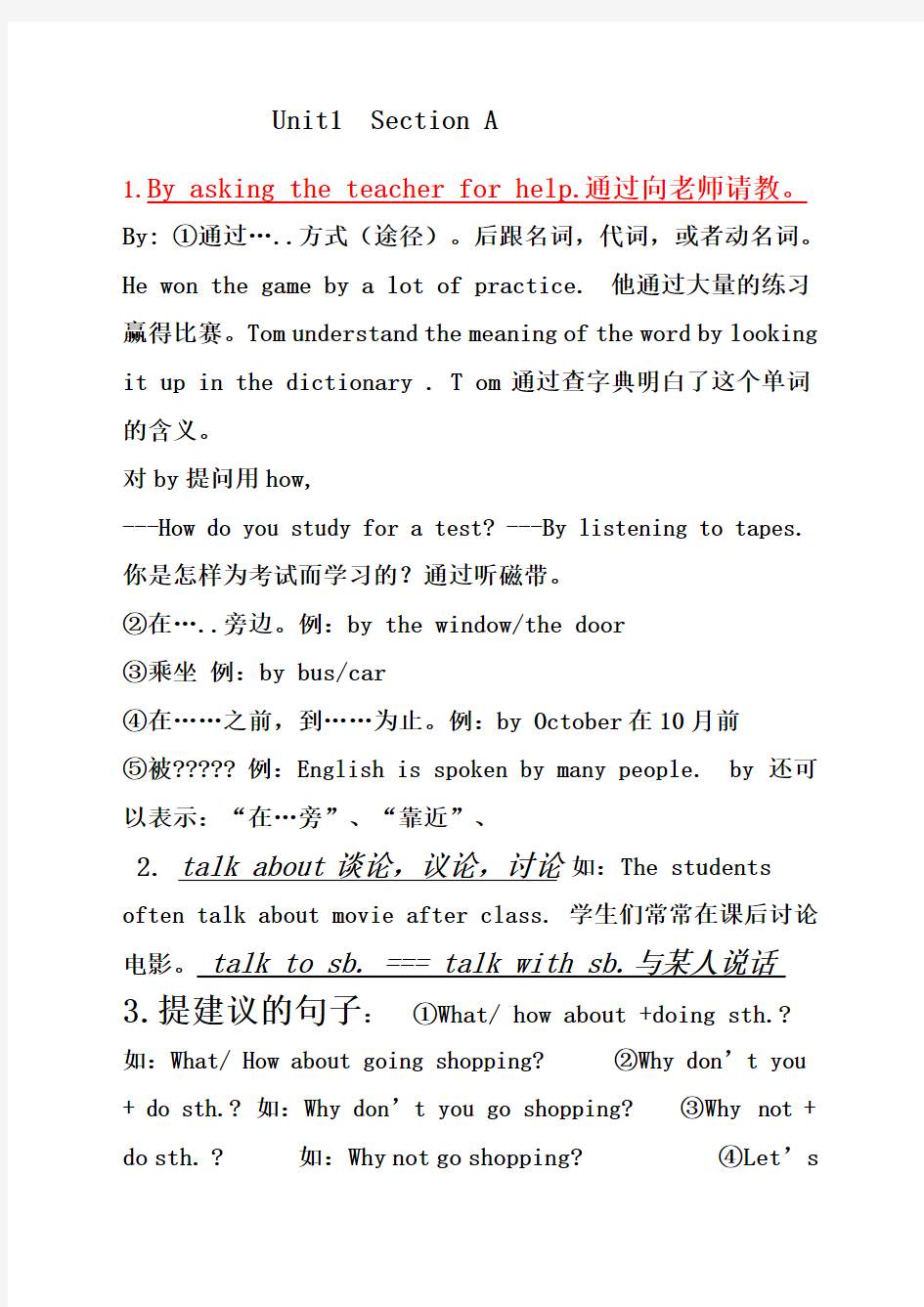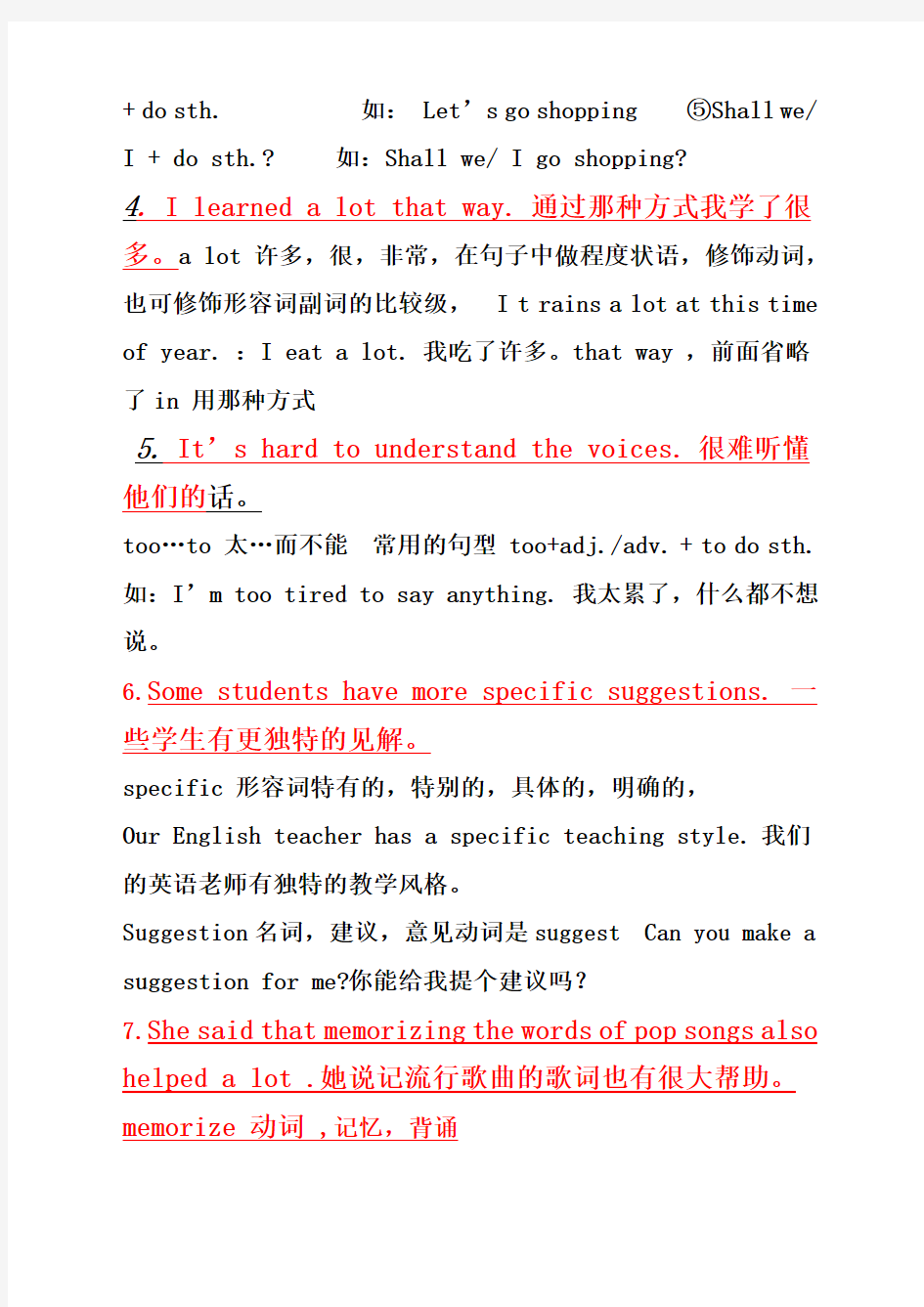

Unit1 Section A
1.By asking the teacher for help.通过向老师请教。By: ①通过…..方式(途径)。后跟名词,代词,或者动名词。He won the game by a lot of practice. 他通过大量的练习赢得比赛。Tom understand the meaning of the word by looking it up in the dictionary . T om 通过查字典明白了这个单词的含义。
对by提问用how,
---How do you study for a test? ---By listening to tapes.你是怎样为考试而学习的?通过听磁带。
②在…..旁边。例:by the window/the door
③乘坐例:by bus/car
④在……之前,到……为止。例:by October在10月前
⑤被????? 例:English is spoken by many people. by 还可以表示:“在…旁”、“靠近”、
2. talk about 谈论,议论,讨论如:The students often talk about movie after class. 学生们常常在课后讨论电影。talk to sb. === talk with sb. 与某人说话
3.提建议的句子:①What/ how about +doing sth.? 如:What/ How about going shopping? ②Why don’t you + do sth.? 如:Why don’t you go shopping? ③Why not + do sth. ? 如:Why not go shopping? ④Let’s
+ do sth. 如:Let’s go shopping ⑤Shall we/
I + do sth.? 如:Shall we/ I go shopping?
4. I learned a lot that way. 通过那种方式我学了很多。a lot 许多,很,非常,在句子中做程度状语,修饰动词,也可修饰形容词副词的比较级, I t rains a lot at this time of year. :I eat a lot. 我吃了许多。that way ,前面省略
了in 用那种方式
5. It’s hard to understand the voices. 很难听懂
他们的话。
too…to 太…而不能常用的句型 too+adj./adv. + to do sth. 如:I’m too tired to say anything. 我太累了,什么都不想说。
6.Some students have more specific suggestions. 一些学生有更独特的见解。
specific 形容词特有的,特别的,具体的,明确的,
Our English teacher has a specific teaching style. 我们
的英语老师有独特的教学风格。
Suggestion名词,建议,意见动词是suggest Can you make a suggestion for me?你能给我提个建议吗?
7.She said that memorizing the words of pop songs also helped a lot .她说记流行歌曲的歌词也有很大帮助。memorize 动词 ,记忆,背诵
We have to memorize the new words in the test. 我们必须背下课文里的新单词。
副词,不同地,有区别地
9.She found watching movies frustrating because the people speak too quickly. 他发现看电影是令人沮丧的,因为他们说话太快。find watching movies frustrating 发现看电影令人沮丧
find + 宾语 + (名词形容词等)
I find him friendly.??我发现他很友好。?????? I found him working in the garden.我发现他真在花园工作。
We found him in bed.????????????? He found the window closed.
about reading aloud to practice pronunciation 大声朗练习发音怎么样?
read aloud 大声朗读
aloud, loud与loudly的用法,三个词都与"大声"或"响亮"有关。①aloud是副词,重点在出声能让人听见,但声音不一定很大, 常用在读书或说话上。通常放在动词之后。aloud没有比较级形式。如: He read the story aloud to his son.他朗读那篇故事给他儿子听。②loud可作形容词或副词。用作副词时,常与speak, talk, laugh等动词连用,多用于比较级,须放在动词之后。如: She told us to speak a little louder. 她
让我们说大声一点。③loudly是副词,与loud同义,有时两者
可替换使用,但往往含有令人讨厌或打扰别人的意思,可位于动词之前或之后。如: He does not talk loudly or laugh loudly in public. 他不当众大声谈笑。
added that having conversations with friends was not helpful at all.她还说与朋友们交谈一点帮助都没有。not …at all 一点也不根本不如:I like milk very much. I don’t like coffee at all. 我非常喜欢牛奶。我一点也不喜欢咖啡。 not经常可以和助动词结合在一起,at
all 则放在句尾
12. We get excited about something and then end up speaking Chinese.当我没谈的起劲的时候,我们最终还是说中文。.get excited 高兴,激动???
be / get excited about sth.=== be / get excited about doing sth. === be excited to do sth. 对…感兴奋如:I am / get excited about going to Beijing.=== I am excited to go to Beijing. 我对去北京感到兴奋。 .
常见的有:①是:am 、is、 are???? ②保持:keep、stay???
③转变:become、 get、 turn ④……起来 feel、 look、smell、 taste、 sound后面都接形容词
① end up doing sth 终止做某事,结束做某事如:The party ended up singing. 晚会以唱歌而结束。② end up
with sth. 以。。。结束如: The party ended up with her singing. 晚会以她的歌唱而告终。end up 结束Section B and self check
1.I can’t pronounce some of the words.有的单词我不会读。
pronounce 动词,发音。
I can pronounce all the words in the newspaper我能读出这张报纸上所有的单词.
I don’t know how to pronounce this new word我不知道这个生词怎么发音。
.pronunciation 名词发音,发音方法
He has a good pronunciation. 他的发音很好。
The word has two pronunciations.这个单词有两个发音。can’t understand spok en English.我听不懂口语。
spoken 口头的,口语的。 speaking 讲话的,说某种语言的。
3.I make mistakes in grammar.我犯语法错误。
make mistakes 犯错make mistakes in sth. 在某方面犯错 by mistake 错误地,无意地
I often make mistakes. 我经常犯错
The more careful you are,the fewer mistakes you will make.你越细心,你犯的错误就越少。
He made a lot of mistakes in his spelling.他在拼写方面犯了很多错误。
I took your book by mistake.我错拿了你的书。
4.can’t get the pronunciation right发音不准确.get...right使。。。正确get +sb\sth+adj. 使某人或某物处于某种状态The work gets me tied.
get + 宾语 + 宾补(形容词)使某种情况发生
Get the shoes clean. 把鞋擦干净?? Get Mr. Green to come. 让格林先生进来
You can’t get him waiting. 你不能让他老等着
don’t have a partner to practice with. 我没有可以一起练习(英语)的伙伴. 动词不定式做
He is always the first to come.他总是第一个到的人。
I have nothing to say.??我没什么可说。??????
I need a pen to write with.我需要写字的钢笔。
I need some paper to write on.?我需要一些写字的纸????? I don’t have a room to live in.我没有住的房间。
6.F irst of all,it was’t easy for me to understand the teacher when she talked.首先,当老师讲话时对我来说明白她说的什么是不容易的。 first of all 首先。强调顺序。
We will learn Lesson 4,first of read new words..
7.To begin with,she spoke too quickly,and I can’t understand every word.起初,她说的太快,我不是每个词都能听懂。
begin with 以。。。作为开始=start with
To start with,we don’t have enough money.起初,我们没有足够的钱。
https://www.doczj.com/doc/db18631044.html,ter on,I realized that it doesn’t matter if I don’t understand every word.后来,我意识到听不懂每个单词是没关系的。
later on 随后,以后
It will be hotter later on随后天气会更加炎热。
He became a scientist later on.
realize 动词,认识到,了解到
I realized I made a mistakes.我意识到我犯了一个错误。
W e did n’t realize the serious problem.我们没有意识到这个严重的问题。
9.I was also afraid to speak in class,because I thought my classmates might laugh at me.我也害怕在课堂上讲话,因为我认为同学们会嘲笑我。
afraid 动词,怕,害怕
be afraid of sb/sth, 害怕某人、某物
be afraid to do sth.=be afraid of doing sth.害怕做某事
be afraid that恐怕,担心,表示委婉语气
Don’t be afraid of making mistak es when you speak English.说英语时不要害怕出错。
The little girl is afraid of the dark.这个下女孩怕黑。She is afraid to go out alone at night.她害怕晚上独自出门。
I am afraid that I have to go now.我恐怕要走了。
laugh at sb.笑话;取笑(某人)
Don’t laugh at people in trouble.不要嘲笑陷入困境中的人。
12. take notes 做笔记,做记录
We are busy taking notes carefully in class.上课的时候我没忙着认真做笔记。
Mr Zhang was taking notes while listening to the talk.张先生边听报告边做笔记。
teacher is very impressed.(我的英语成绩)给我的老师留下了深刻的印象。
impress 动词,使感动,使。。。留下深刻印象
be impressed by ...因。。。而印象深刻
We are impressed by her smile.我们对她的微笑印象深刻。My progress in English has impressed my classmates greatly.我在英语上取得的进步给同学们留下深刻的印象。
17. make up 组成、构成
18. one of +(the+ 形容词比较级)+名词复数形式…其中之
一如: She is one of the most popular teachers. 她是最受欢迎的教师之一。
22. unless 假如不,除非引导条件状语从句如:You
will fail unless you work hard..假如你不努力你会失败。 I won’t write unless he writes first. 除非他先写要不我不
写 23. deal with 处理如:I dealt with a lot of problem.
24.worry about sb./ sth. 担心某人/ 某事如:Mother worried about his son just now. 妈妈刚才担心他的儿子。
25. be angry with sb. 对某人生气如:I was angry with her. 我对她生气。
) 过去如: Two years went by句末 ??? ①放在末表示“也”??????????? ②两者中的“任一”
③either…or… 或者…或者.…引导主语部分,按照处理
完成,是个较正式的词,后不能接?? finish指日常事物的完成,an 与连用表示“又一”,“再一”。
例:Please give me a second apple.?????? There comes a fifth girl.
除非,如果不,等于“if not”本身就表示否定,引导,主句为,条件状语从句用表示将来。
例:My baby sister doesn’t cry unless she’s hungry.
?? =My baby sister doesn’t cry if she isn’t hungry.
Unless you take more care, you’ll have an accident.如果你不多加小心的话,你会出事的。
:adv 代替,更换。
?? 例:We have no coffee, would you like tea instead?我们没有了,改喝茶好吗?
Stuart was ill, so I went instead.???斯图尔病了,所以换了我去。
instead of 作为某人或某事物的替换
例:Let’s play cards instead of watching TV.
Give me the red one instead of the green one.
21